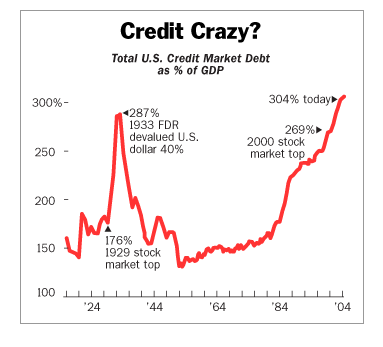

|
| weblog/wEssays | home | |
|
Catalyzing the Great Unraveling (September 3, 2005)  One of high school chemistry's most visual experiments may provide an analogy to Katrina's effect on
the U.S. and world economies. First, salt is dissolved in warm water
to the point of saturation. As the water cools, a point is reached where a sharp tap on the beaker causes the
salt to instantly crystallize.
One of high school chemistry's most visual experiments may provide an analogy to Katrina's effect on
the U.S. and world economies. First, salt is dissolved in warm water
to the point of saturation. As the water cools, a point is reached where a sharp tap on the beaker causes the
salt to instantly crystallize.
The point is not that Katrina's aftermath may prove to be the proximate cause of the great unraveling, but that the global financial situation is so precarious that any shock would have been an equally effective catalyst. Consider two apparently unrelated items from the August 22 edition of the Wall Street Journal, one on U.S. bank's dwindling reserves to offset future bad loans, and the other on the growing power of an obscure Chinese banking agency which now owns half of the biggest Chinese banks: In the U.S.:So let's see if we have this straight. Just as risky interest-only mortgages are increasingly the bread-and-butter of the U.S. banking system, then these same banks are lowering their reserves for bad debts in order to appear profitable. At the same time, total U.S. debt has skyrocketed (see chart above). Can you say "disaster in the making?" At the same time, a politically byzantine, utterly opaque quasi-governmental agency of the Chinese Central Government has "saved" China's largest banks from insolvency by pumping $60 billion into the biggest three and untold tens of billions more into smaller rivals--all in the hopes of enticing Western capital to flow in and save them the trouble of throwing more money down the bottomless rathole of the Chinese banks' bad debt. Do these stories paint a picture of a robust, transparent, low-risk global financial system? On the contrary, they reveal a system poised on the precipice of collapse. * * * copyright © 2005 Charles Hugh Smith. All rights reserved in all media. I would be honored if you linked this wEssay to your site, or printed a copy for your own use. * * * |
||
| weblog/wEssays | home |